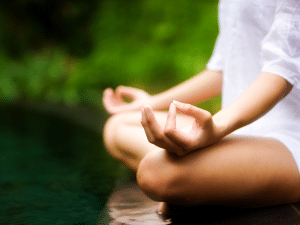4 Natural Remedies to Sleep
Best Sleep Remedies
More than a third of American adults are not getting enough sleep on a regular basis according to a study done by the Centers for Disease Control and Prevention’s (CDC). See our sleep tips:
Sleep Deprivation, in the short term, can negatively impact our mood, judgement, and ability to learn and retain information. Chronic sleep deprivation can lead to an increased risk of obesity, diabetes, and cardiovascular disease, among many others health complications due to a weakened immune system.
Whether it’s from body aches and pains, anxiety, or poor sleep habits, we’ve all felt restless in the wake of the night, at one point or another. Here are some natural remedies to combat late night tossing and turning.
Meditation

Racing thoughts can be difficult to stray away from. Practicing meditation before bed helps relax your body and mind. Mindfulness meditation draws your attention to present thoughts while encouraging you to drift away from past and future thoughts. Meditation will break everyday thoughts, which evokes relaxation and counteracts our body’s fight or flight responses to anxiety.
With the amount of time people spend in the office now-a-days, it’s difficult not to focus on our past performance and future project all the time. Meditation is a great habit to pick up in order to unwind at the end of the day before bed. With a few simple breathing exercises you can release all the tension you’ve picked up and have carried through the day. Becoming self aware will put you in a more peaceful state and ready your mind and body for sleep.
Stretching

In combination to meditation, a mind exercise, you may also want to consider light stretching before bed. Being active all day can also take its toll on our body as well. Not only does stretching relax muscles, it can also improve blood flow. Say goodbye to tossing and turning in hope of finding comfort.
If you suffer from back and neck pain while sleeping, stretching is great preventative option. The purpose of sleep is to help our body recover by storing tissues and cells. Stretching will help catalyze your body’s recovery response. Here are a few lists of stretches you can do before bed.
Warm Baths
Naturally, we sleep better when we are cooler, which is why our body’s core temperature starts to fall just before we’re ready to go to bed. This process help induce relaxation in order to fall asleep faster.
Soaking in a warm bath is not only soothing, but hygiene also helps our body regulate temperature more efficiently. The rapid change in temperature from a warm bath to cooling down before bed will improve your body’s relaxation.
Hot Tea

Sit back, sip, and relax. Be careful though. Some teas are caffeinated, which will help you with everything besides relaxing. Herbal teas; however, help soothe and calm your body. The activity itself will also help you get in the habit of unwinding before bed. Routine alone will prepare your body for rest.
Chamomile’s relaxing and sedative effect is great after a hectic day and an excellent choice for a night aid. Lemon balm helps calm the nervous system all the while stimulating the heart. Not only is lemon balm great before bed, but can also soothe headaches. Linden is a great remedy for nervousness, anxiety, insomnia, headaches, and reducing high blood pressure.
If you continue to struggle with sleep, there are a few additional things you may want to consider. Sleep structure may be a contributor to aches and pains in the morning. The lifespan of a mattress is typically 7-12 years even with good care and maintenance.
You may also want to asses whether or not you have other disturbances in the room such as temperature, light, and even allergens(hello pet fur).
Sleep is paramount to our mental and physical health. Fostering good sleep habits can help improve our daily productivity and wellbeing.
Happy Sleeping!
Further tip: Aromatherapy essential oils are also good to use for sleep disorders. Learn Basic Aromatherapy
Post views: 938